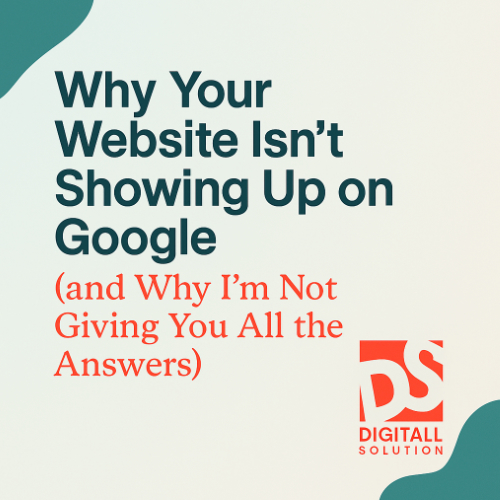Why Your Website Isn’t Showing Up on Google (and Why I’m Not Giving You All the Answers)

Web | 6 November 2025 - 4 min
Why Your Website Isn’t Showing Up on Google (and Why I’m Not Giving You All the Answers)
It’s one of the most common questions small business owners ask:
“Why isn’t my website showing up on Google?”
You’ve built your site, maybe even added a few keywords, and yet when you search for it — nothing.
Not page one. Not page ten. Nowhere. So what’s going on?
1. Google Doesn’t Know You Exist Yet
Google doesn’t just automatically know your site is online — it has to find and index it.
That usually happens through:
A sitemap submission (which tells Google where all your pages are)
Backlinks or social shares (which lead Google to you) Or, sometimes, sheer luck.
If you’ve never used Google Search Console or submitted a sitemap.xml, Google probably hasn’t even discovered you yet. (And no — shouting your domain name at your laptop doesn’t help.)
2. You’re Competing With Giants
Let’s say you’re an event planner in Manchester. You type “event planner Manchester” into Google — and get buried under massive directories, big agencies, and paid ads.
Here’s the harsh truth: Google doesn’t owe you visibility.
You have to earn it with relevant content, location pages, and proper optimisation.
You can absolutely outrank the big guys — but it takes more than a Facebook bio and a Wix site.
3. Your Website Isn’t Telling Google the Right Story
Search engines don’t “see” design — they read structure.
If your headings, meta tags, and content aren’t aligned, Google won’t know what your site is about.
Think of it this way:
To Google, your website isn’t a masterpiece — it’s a document.
The better you label it, the easier it is to file it in the right place.
That’s why properly structured pages with clear hierarchy and focus keywords matter more than any fancy animation.
4. You Changed Domains or URLs
If you’ve recently switched from .com to .co.uk or changed your page URLs, Google needs time to re-index everything.
That can take weeks — even if everything’s done correctly.
And if redirects or DNS settings aren’t perfect, Google can lose the trail altogether.
5. You’re Missing the Technical Stuff (and It’s a Headache)
There’s a reason SEO pros get paid — not because we know all the secrets, but because we know how to decode the nonsense.
Things like:
SSL certificates
DNS
MX records
CNAMEs
robots.txt
canonical tags
To most people, that sounds like alphabet soup. To Google, it’s the language of trust and structure.
If that sentence made you sigh — that’s exactly why trying to DIY your SEO is like changing your own timing belt.
You might manage it, but it’ll cost you more when it breaks.
💬 So Why Am I Not Giving You All the Answers?
Because this stuff is deep — and every business, platform, and goal is different.
You can’t fix everything with one “top 10 tips” list (despite what Google’s search results would have you believe).
What you can do is start smart:
Make sure Google can find you (submit a sitemap)
Use proper headings and structure
Create content that answers real search questions
And when you’re ready to stop guessing — that’s where I come in.
Want to actually show up on Google?
👉 Chat with Carl at Digitall Solution — I’ll tell you what Google’s been ignoring and how to fix it properly.
Written by Carl Poole

What i do for my clients
I help small businesses get found online and look professional doing it.
That means building fast, clean websites and setting them up properly so Google actually pays attention.
Every project starts with the basics — a site that’s secure, mobile-friendly, and easy to manage — then we layer on SEO that’s real, not robotic. I make sure your pages, locations, and blogs all work together to bring in the right visitors, not just numbers.
I don’t talk in jargon or sell “mystery marketing.” I explain what’s happening, why it matters, and what results to expect.
You’ll always know what’s being done and why — no gimmicks, just honest work that gets you seen, trusted, and remembered.
Want to see how I’d improve your site? Get a free mini audit
© DIGITALL SOLUTION (DIGITALL UK Group) - All rights reserved 2025.


